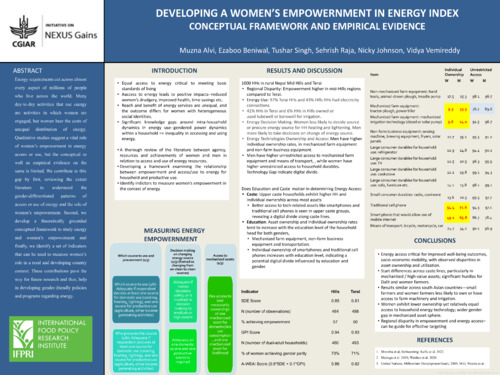Developing a women’s empowerment in energy index: Conceptual framework and empirical evidence
Abstract
Equal access to clean energy is key to meeting SDG 5 (gender equality) and SDG 7 (ensuring access to affordable, reliable, sustainable, and modern energy services for all). However, energy access is not distributed equally, with more than 80% of energy poverty—the lack of access to sustainable, modern energy services and products—concentrated in rural FROM RESEARCH TO IMPACT, October 2023 37 areas, where it affects agriculture, food security and nutrition, and reduces livelihood opportunities and well-being. At the same time, a transformation in energy technology and resources is underway as the world moves to more efficient ways of conducting day-to-day activities while enhancing productivity. But are the gains from energy transformation distributed equitably within and across countries, communities and households? Research examining genderdifferentiated patterns of energy use or access, and the role that women’s empowerment plays in this, is scant. We contribute to the knowledge gap by reviewing the extant literature to understand the gender-differentiated patterns of access or use of energy and the role of women’s empowerment. We develop a theoretically grounded conceptual framework to study energy and women’s empowerment and identify a set of indicators that can be used to measure women’s role in a rural and developing country context. We hypothesize that multiple dimensions of empowerment such as mobility, agency, and control over income, are the main drivers as well as outcomes of equitable energy use and access. We test this using detailed survey data from India, Pakistan, and Nepal, using empirical evidence linking women’s energy use portfolio to measures of empowerment.

